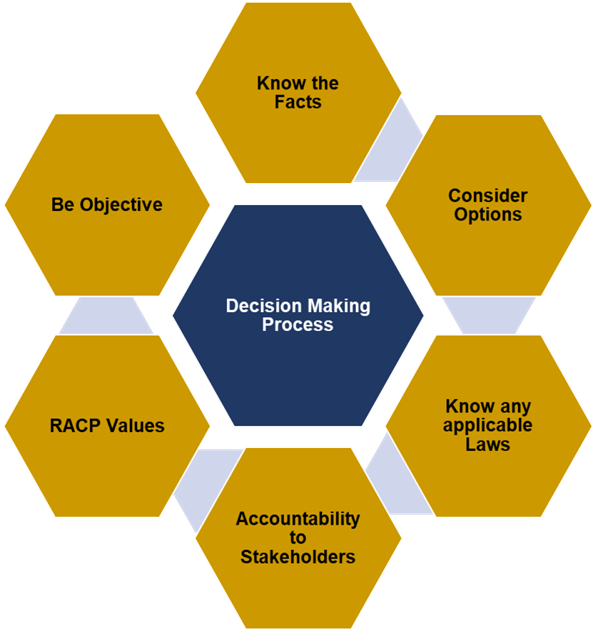Decision-making checklist
For the College Board and its College Bodies
The Royal Australasian College of Physicians is committed to procedural and substantive
fairness and sound decision-making. This guideline is provided to support directors and College Body members in considering and deciding on matters before them when discharging their duties.
Infographic
1. Does the Board or College Body have the authority to make the decision?
2. Has the Board or College Body acted in good faith and for the proper, intended and authorised purpose?
3. Is there any limitation on the decision-making process, such as legislation or College policies?
4. Have all reasonable steps been taken to understand the facts that are important to the decision?
5. Is the decision impartial and free from any perceived or actual bias by ensuring that no members have any personal interest in the outcome of the matter or any conflict of interest, whether personal or professional?
6. Are College policies, procedures and processes satisfied?
7. Has the decision maker considered everything that is relevant to the decision and nothing that is irrelevant?
8. Is the decision based on the evidence provided in the briefing paper?
Make findings of fact-based on evidence. Where there is conflicting evidence, make findings of fact on the balance of probabilities - that is, taking into account all of the relevant evidence, this particular fact is more likely to be proved than not.
9. Has weight been given to particular evidence in a logical and reasonable manner?
Assign greater weight to important considerations and less weight to less important considerations.
10. Has a decision been made based on pre-conceived notions or assumptions?
Question and debate long held views or informal protocols.
11. Have College policies been applied appropriately?
College Body members should be open to evidence that puts an application beyond the normal application of the policy. Discretion must also be applied in placing weight on such evidence.
12. Does the decision adversely impact an individual or an entity?
Ensure that the person or entity affected by the decision is provided with procedural fairness. This means providing an opportunity for the person to understand the case, be heard and understand the role of the Committee.
13. Is the decision ethical and does it align with the College’s objectives?

Back to Governance documents
Decision Making for the Board and its College Bodies Guideline